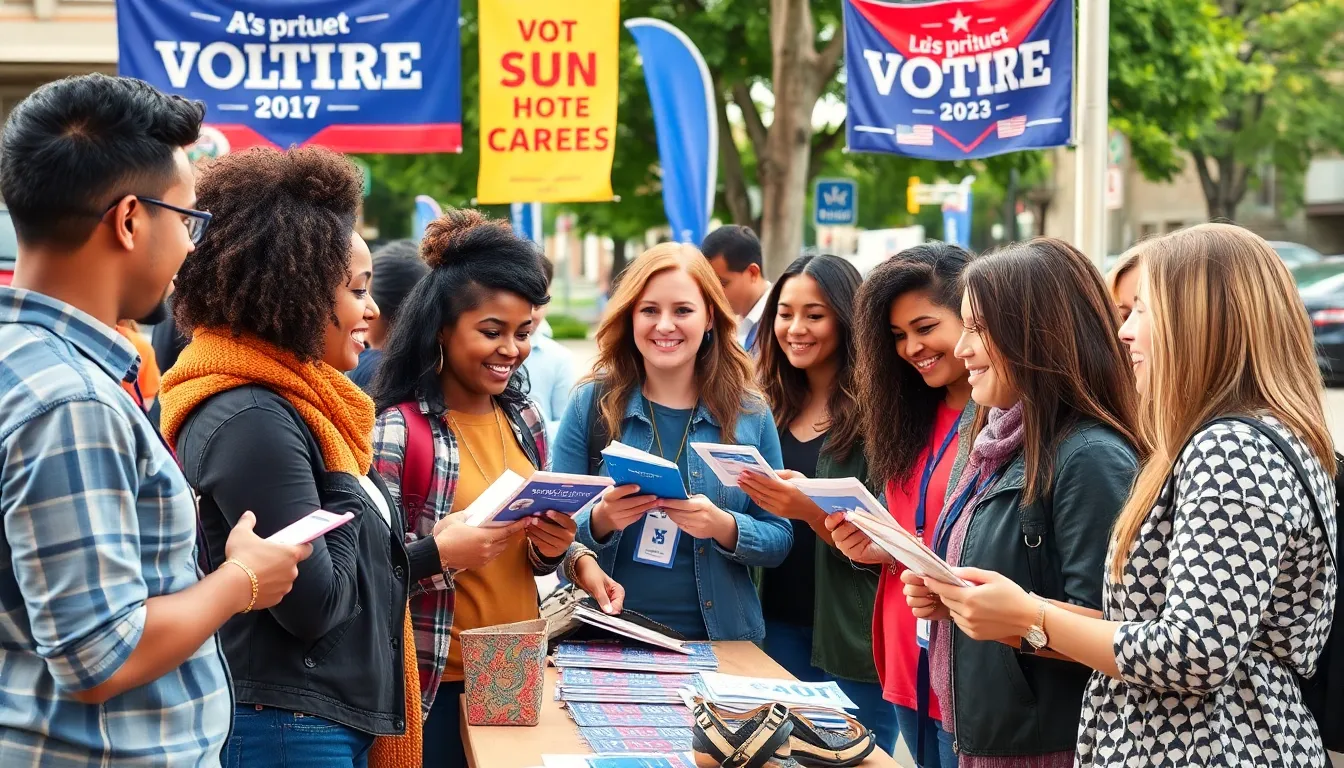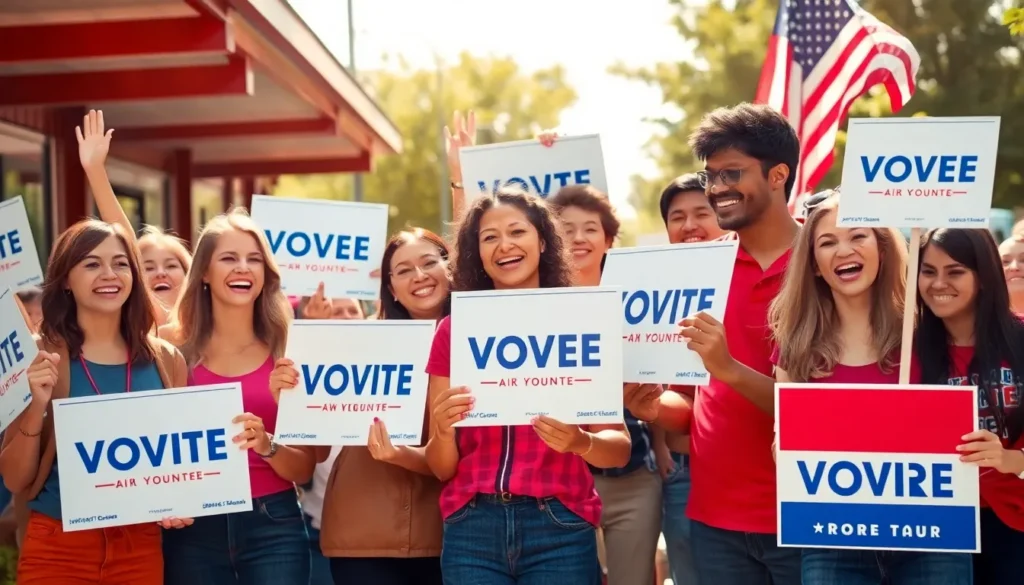In the grand theater of democracy, a political campaign is the dazzling production that captures the audience’s attention and sways their votes. Picture this: candidates donning their best suits, armed with catchy slogans and promises that could make even a used car salesman envious. It’s a high-stakes game where the right mix of charisma, strategy, and a dash of humor can turn the tide in their favor.
What Is a Political Campaign?
A political campaign refers to an organized effort by a candidate to win an election. Candidates assemble teams that coordinate political strategies focused on garnering support. Charismatic leadership often plays a crucial role during these campaigns, as it helps candidates connect with voters.
Key components define a political campaign. Advertising serves as one such element, utilizing various media platforms to share messages. Messaging consistency enhances recognition and keeps voters informed about a candidate’s positions. Fundraising becomes essential, as it provides the resources needed for effective outreach.
Strategic planning remains vital. Campaigns outline tactics to engage different demographics, tailoring messages to resonate with target audiences. Polling data also informs campaign strategies, helping teams understand the electorate’s preferences and concerns.
Debates present opportunities for candidates to showcase their policy knowledge and interpersonal skills. They enable candidates to distinguish themselves from opponents. Additionally, volunteers contribute significantly by canvassing neighborhoods, making phone calls, and organizing events.
Candidates often employ catchy slogans and memorable imagery. These tools grab attention and create lasting impressions on potential voters. Humor, when used appropriately, can disarm critics and make candidates appear relatable.
Digital platforms play an increasingly important role in modern campaigns. Social media facilitates direct communication between candidates and voters, allowing for real-time feedback. Engaging multimedia content captivates audiences and encourages them to share campaign messages within their networks.
In sum, a political campaign encompasses various tactics and strategies, all aimed at achieving electoral success. Essential components intertwine to create a dynamic process that influences democratic participation.
Purpose of a Political Campaign

Political campaigns serve as structured efforts to engage and influence voters during elections. They aim to garner support for a candidate through various strategic approaches.
Mobilizing Voters
Mobilizing voters involves organizing efforts that encourage participation in elections. Campaigns utilize grassroots strategies to connect with constituents directly. Volunteers orchestrate door-to-door initiatives and host events to increase engagement. Targeted outreach helps identify key demographics, ensuring messaging resonates with specific groups. Mobilization also relies on social media platforms, facilitating communication and fostering community. Candidates often share compelling narratives to inspire voter turnout, emphasizing the importance of each vote in shaping the election outcome.
Shaping Public Opinion
Shaping public opinion is pivotal in determining candidates’ success. Campaigns employ advertising across multiple media channels to create favorable perceptions. Consistent messaging reinforces candidates’ platforms, ensuring clarity around issues that matter. Debates provide opportunities for candidates to articulate their stances while evaluating opponents’ positions. Polling data guides campaigns in tailoring messages that address constituents’ priorities. Through effective storytelling and memorable imagery, campaigns influence attitudes and perceptions, ultimately swaying undecided voters and consolidating support among committed ones.
Key Components of a Political Campaign
Political campaigns encompass several essential elements that contribute to their effectiveness and reach. Understanding these components helps clarify how campaigns connect with voters.
Candidate Development
Candidates undergo extensive development to prepare for elections. Personal branding plays a crucial role in creating a compelling public persona. Candidates often engage in media training to improve communication skills and debate performance. Background research helps candidates articulate their positions on key issues effectively. Additionally, candidates establish strong platforms aligned with voter interests, showcasing their stances on policies that matter most to constituents.
Campaign Strategy
Successful campaigns depend on a well-defined strategy. Campaign teams analyze polling data to tailor messages for specific demographics. Strategic use of advertising channels, including online platforms, aids in reaching diverse audiences. Grassroots efforts, such as community events and town halls, enhance voter engagement and mobilization. Overall, a structured campaign strategy fosters effective messaging, ensuring candidates resonate with voters throughout the electoral process.
Fundraising Efforts
Fundraising constitutes a vital component for campaign viability. Campaigns utilize various approaches to gather financial support, including grassroots donations and high-profile fundraising events. Effective outreach to donors ensures a steady influx of resources necessary for advertising and outreach programs. Transparency in campaign finances builds trust among supporters. Mobilizing volunteers for fundraising initiatives amplifies efforts, allowing campaigns to expand their reach and maintain momentum leading up to elections.
Types of Political Campaigns
Political campaigns vary significantly based on the election’s scope and goals. Understanding these types enhances insight into how candidates connect with voters.
Local Elections
Local elections concentrate on community-specific issues. Candidates running for mayor, city council, or school board often focus on topics that directly impact residents. Grassroots strategies play a crucial role, as candidates engage voters through town halls and neighborhood meetings. Issues like housing, education, and public safety often dominate local conversations. Campaigns utilize door-to-door canvassing to mobilize support. Volunteers frequently assist with outreach efforts while social media promotes candidates’ platforms. Engaging local media helps amplify the candidates’ messages and increase visibility within the community.
National Elections
National elections encompass broader political landscapes and larger candidate platforms. These campaigns typically target a wide range of issues, from immigration to healthcare. Candidates running for Congress or President often invest significantly in advertising across various media channels. Debates provide valuable opportunities for showcasing positions on key policies. Polling data guides messaging to resonate with diverse voter demographics. National campaigns utilize extensive grassroots networks, fostering community engagement through volunteers. Fundraising is critical, with major events and small-dollar donations fueling campaign efforts. Voter turnout strategies are consistently prioritized to maximize electoral impact.
Political campaigns are vital to the democratic process. They engage voters and shape public opinion through strategic messaging and grassroots efforts. Candidates must navigate a complex landscape of media, fundraising, and direct outreach to connect with constituents effectively.
Success hinges on a blend of charisma and strategy, with each campaign tailored to resonate with specific demographics. As the political landscape evolves, so do the methods of engagement, particularly through digital platforms. Ultimately, the effectiveness of a campaign can determine the future direction of communities and nations alike.





